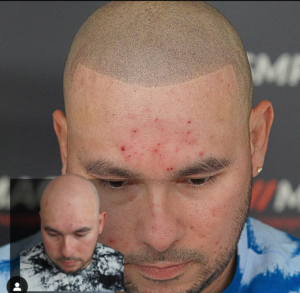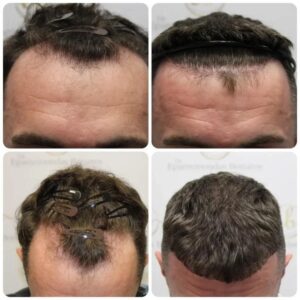Losing hair during medical treatments can be a distressing experience. Fortunately, cold cap therapy offers hope to those seeking to minimize hair loss. In this comprehensive guide, we will explore the possibility of hair regrowth after cold cap therapy and delve into the science behind hair regrowth after treatment. Whether you’re currently undergoing cold cap therapy or considering it, understanding how to promote hair regrowth is essential for reclaiming your confidence and embracing healthy, lustrous hair.
Table of Contents
Key Takeaway
Hair regrowth after cold cap therapy is a journey that requires a comprehensive approach to promote optimal results. Hair loss during chemotherapy is a common side effect of cancer treatment that can be emotionally challenging for patients. However, scalp cooling treatment, which involves wearing a scalp cooling system during chemo treatment, has shown promising results in reducing hair loss.
The effectiveness of scalp cooling depends on the type of chemotherapy being used, and many insurance companies now cover this innovative approach. The scalp cooling system works by lowering the temperature of the scalp, narrowing the blood vessels, and minimizing the amount of chemotherapy reaching the hair follicles. I
t is important to note that the scalp cooling treatment has been cleared by the Food and Drug Administration (FDA) for certain types of chemotherapy. Patients using this system typically wear a cooler with dry ice, which circulates cooled liquid through a cap worn on the head during chemotherapy sessions.
This cooling process can help preserve hair during treatment, offering patients a sense of normalcy and a potential boost in self-confidence amidst their cancer journey.
Understanding Cold Cap Therapy
Cold cap therapy is a technique that involves using specialized caps to cool the scalp during chemotherapy or radiation treatments. By reducing the temperature of the scalp, the cold caps constrict blood vessels, minimizing the impact of these treatments on hair follicles.
While cold cap therapy is not guaranteed to prevent hair loss, it has proven effective in many cases, allowing some patients to retain a significant amount of their hair. However, it’s important to note that the success of cold cap therapy may vary depending on the specific treatment protocol and individual factors.
The Science Behind Hair Growth
To comprehend hair regrowth after cold cap therapy, it’s vital to understand the intricacies of the hair growth cycle. Hair follicles undergo continuous cycles of growth (anagen phase), rest (telogen phase), and shedding (exogen phase).
Various factors influence hair growth, including genetics, hormones, and overall health. During cold cap therapy, the cold temperature helps minimize the impact of chemotherapy or radiation on hair follicles, potentially allowing them to remain in the growth phase for longer and reducing hair loss.
After completing treatment, the dormant hair follicles have the potential to be activated, leading to regrowth.
Promoting Hair Regrowth After Cold Cap Therapy
After completing cold cap therapy, focusing on scalp and hair care becomes paramount in promoting hair regrowth. It is important to maintain a healthy scalp and hair care routine.
This includes regular washing with gentle shampoos and conditioners to keep the scalp clean and debris-free. It is advisable to use mild products without harsh chemicals that can further damage fragile hair.
Gently pat the hair dry with a soft towel instead of rubbing vigorously to minimize friction and breakage.
Nourishing hair care products can also play a significant role in stimulating regrowth. Look for products that contain ingredients known to support hair health, such as biotin, keratin, and essential oils like rosemary or lavender. These ingredients can nourish the scalp and promote a healthy environment for hair regrowth.
In addition to using hair care products, incorporating scalp massage into your routine can help stimulate blood circulation to the scalp, delivering vital nutrients to the hair follicles. Massaging the scalp with your fingertips in circular motions for a few minutes daily promotes relaxation and potentially enhances hair regrowth.

Nutritional Considerations for Hair Regrowth
Eating a balanced diet is crucial for promoting hair regrowth after cold cap therapy. Essential nutrients that support healthy hair growth include vitamins A, C, and E and biotin, zinc, and omega-3 fatty acids.
These nutrients help nourish the scalp and provide the building blocks for hair follicle health. Incorporate foods rich in these nutrients into your diet, such as leafy greens, citrus fruits, berries, eggs, fish, nuts, and seeds.
It’s important to remember that maintaining overall good health is vital for hair regrowth. Ensure you’re staying adequately hydrated, as dehydration can affect the health of your scalp and hair. Avoid crash diets or extreme restrictions, as they may deprive your body of essential nutrients for hair regrowth.
Lifestyle and Habits for Hair Regrowth
Managing stress effectively is crucial for optimal hair regrowth. High-stress levels can disrupt the hair growth cycle and contribute to hair loss.
Incorporate stress management techniques into your daily routine, such as meditation, deep breathing exercises, yoga, or engaging in hobbies that help you relax and unwind.
Taking time for self-care and prioritizing activities that bring you joy can positively impact your overall well-being and, in turn, promote hair regrowth.
Regular exercise is another important factor in promoting hair growth. Exercise improves blood circulation throughout the body, including the scalp, which helps deliver essential nutrients to the hair follicles. Aim for at least 30 minutes of moderate-intensity exercise most days of the week. Choose activities you enjoy, such as brisk walking, jogging, cycling, or dancing, to make it a sustainable part of your routine.
Adequate sleep is often overlooked but plays a significant role in maintaining overall health and promoting hair regrowth. During sleep, the body repairs and rejuvenates itself, including the hair follicles. Aim for 7-8 hours of quality sleep each night to support optimal hair health. Establish a bedtime routine that promotes relaxation, such as avoiding electronic devices before bed, creating a comfortable sleep environment, and practicing relaxation techniques like reading or listening to soothing music.
Seeking Professional Help
While this comprehensive guide provides valuable insights and tips, consulting with a healthcare professional or dermatologist for personalized advice is essential. They can assess your situation, guide hair regrowth after cold cap therapy, and recommend suitable medical treatments or interventions if needed.
Topical medications or procedures like hair transplants may be options to explore under professional guidance. Additionally, alternative therapies such as laser therapy or micro-needling may sometimes be recommended.
Hair Regrowth After Cold Cap Therapy FAQs
1. Does a cold cap help with hair regrowth?
While cold cap therapy can minimize hair loss during treatment, its direct impact on hair regrowth varies for each individual. It is not a guaranteed method for regrowth.
2. Do you lose hair despite the cold cap?
Hair loss may still occur despite using cold caps, but it can help reduce the severity and extent of hair loss.
3. When does hair stop shedding after a cold cap?
Hair shedding usually subsides within a few weeks after completing cold cap therapy. However, the regrowth phase may take several months.
4. Can hair grow back thicker after chemo?
Hair regrowth after chemotherapy varies for each individual. Sometimes, hair can grow back thicker and healthier, but it is not guaranteed for everyone.
Conclusion
Promoting hair regrowth after cold cap therapy requires a comprehensive approach encompassing scalp and hair care, proper nutrition, stress management, and professional guidance.
While cold cap therapy can help minimize hair loss during medical treatments, the journey toward regrowth takes time and patience. Embrace a healthy scalp and hair care routine, nourish your body with a balanced diet, manage stress effectively, and consult healthcare professionals for personalized advice.
Stay positive, hopeful, and practice self-care throughout the process. With time, dedication, and the right strategies, you can regain confidence and embrace a beautiful head of hair again.
Need to talk to a professional? Click here to book a free consultation now.


